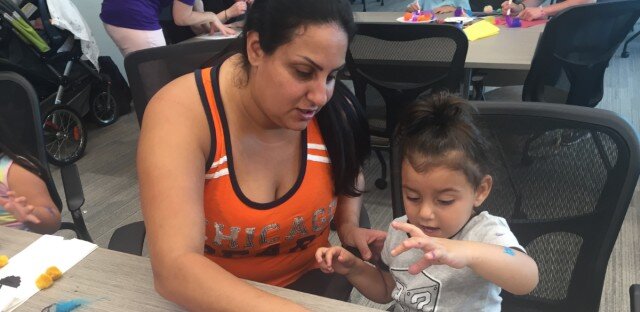School District Reimagines Education System To Start At Birth
On a recent summer day, mothers and toddlers gathered in north suburban Skokie to make paper puppets together.
It’s part of a play group organized through Ready For Success, a comprehensive program that aims to extend the reach of the local school district all the way to birth.
“It’s a good start for them to start going to school,” said one mother in the program, Diana Boudakh, who was helping her toddler daughters glue cutouts onto a paper bag.
School District 69 in Skokie and Morton Grove partnered with the Infant Welfare Society of Evanston to create Ready For Success. The program facilitates learning starting as early as birth for the neediest kids through play groups, home visits and parent education. The district saw a need, because like other districts in Illinois, kids were entering school already behind.
To help avoid that, the district is trying to build on brain science that shows so much more happening in a baby’s brain than previously known.
Stay up-to-date with the latest news, stories and insider events.
SIGN UP
“We’re literally building the foundations of a child’s brain in the first three years, really the first five years of life,” said Stephen Vick, executive director of the Infant Welfare Society of Evanston.
Vick said a baby’s brain can form a million neural connections per second. That brain network is important for memory and learning. If those neural connections aren’t used, they can be eliminated as the child grows.
Updating education
Early childhood education is gaining traction on the political front in Illinois.
Gov. JB Pritzker increased funding for early education by $50 million in the current state budget, and more school districts are expanding their preschool programs.
This comes as a recent report from the Illinois State Board of Education showed only 26% of 5-year-olds were considered kindergarten-ready last school year.
“If the city or state invest all their chips in pre-K, I don’t think we’ll see the needle move at all,” said Geoffrey Nagle, president of the Erikson Institute, a graduate program in early childhood education.
He said the country’s schooling system is based on an antiquated idea that learning only begins when you start to remember things, around age 5.
“But we know now that children start learning the second they’re born, and we haven’t updated or adapted our system to meet the needs of children,” he said.
Research shows the trajectory of academic growth is the same for most students from year to year. But an achievement gap persists all the way through high school because kids aren’t starting at the same level in kindergarten. Researchers said what happens before the age of 5 can signal a person’s success in life.
To help better prepare kids, Ready For Success offers a home visiting program where specialists watch and guide as parents play with their babies.
“It’s really a lot of facilitation during the home visits and helping the parents who may not understand fully what each developmental milestone their child should be at,” said Tiffany Culpepper, who oversee the home visits.
Thinking beyond preschool
Margaret Clauson is superintendent of the Skokie and Morton Grove school district. She said American education is set up as a K-12 system, and as a district, she wasn’t thinking about kids in the community until they showed up for kindergarten.
“I really learned about the importance of prenatal, and as a school system, from birth to 3 years old, I should be worried and concerned,” Clauson said.
She said now through Ready For Success, the school community is trying to rethink the system as a zero to 12th grade education.
Clauson said the feeder high school was seeing similar problems, with kids coming in unprepared for ninth grade. The program is unique in that it will track kids from birth to 12th grade, and administrators will eventually have a large database to show the impact of early education. Research institutions are already planning on using the information.
The program is a year in, and Clauson said the results will take some time.
“What we’re doing with them when they’re 3 months old, we may not see those results until they’re 5, 9, 10 years old,” she said.
That’s part of the challenge in getting more funding, Clauson said. Funders want to see immediate results, and there’s still a perception that early childhood programming is just babysitting.
Right now, Ready For Success’ reach is small. It has limited space for home visiting, a capacity of 60 families. The district’s preschool program has space for 220 students. It’s on a five-year, $4.3 million grant from the state. Clauson is optimistic the program will continue beyond the grant’s life.
Nagle with Erikson said while it’s an advantage for districts to include children earlier than preschool, it’ll take more to close the achievement gap.
“That means family support programs, it means home visiting programs,” he said. “It means paid parental leave so parents can be home with their children.”
Susie An covers education for WBEZ. Follow her on Twitter @WBEZeducation and @soosieon.
Diane Boudakh helps her daughter make a puppet at a play group in Skokie hosted by Ready For Success. The goal is to reach public school students well before they begin kindergarten.


